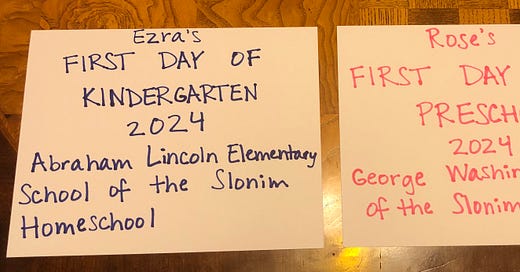It’s back-to-school season! My older kid is in kindergarten. Or is it Kindergarten?
The abbreviation for this grade typically is capitalized (“K”), so should the name of the grade itself be capitalized?
No, says Merriam-Webster. It’s “kindergarten.”
What about a child in that grade? Is he or she a “kindergartener” or “kindergartner”?
According to Merriam-Webster, “kindergartner”—the shorter version—is more common.
I personally like “kindergartener” better as omitting the “e” before the “n” looks like a typo, but perhaps “kindergartner” better reflects how the term is pronounced. Using “kindergartener” isn’t incorrect, though—it’s just the less-used version.
Feel free to use either term—but do capitalize “K” in usages like “K–12.”
While you might occasionally see references to “pre-k” (with a lowercase “k”), there does seem to be a consensus that “K” should be capitalized when used as an abbreviation for kindergarten.
Merriam-Webster does not have an entry just for “K,” but it lists “pre-K” as the correct version of the term without any other variants. (Please don’t write “preK” or “Pre-K” or “PreK” or “pre-k.”) Despite not weighing in on “K” as an abbreviation for “kindergarten” directly, The Chicago Manual of Style does have a Shop Talk article (Shop Talk is their blog) that references “K–12.” Note the en dash (–). Number ranges are expressed with en dashes, not hyphens, in Chicago style (6.78). Occasionally, as in “K–12,” words or abbreviations for words are included in the range. The en dash signifies “up to and including” (6.78). So “K–12” means all the grades from kindergarten to twelfth grade, including kindergarten and twelfth grade.
I wrote out “twelfth grade” on purpose. In Chicago style, numbers zero through one hundred are typically written out (9.2).
So, next year, my son will be in first grade. But will he be a “first-grader” or “first grader”?
In one of their monthly Q&As, CMOS explained this succinctly and clearly:
Nouns like fifth grade and fifth grader are both left open.
Not all of us made it past the eighth grade.
Some second graders are more advanced than others.
Adjective forms, however, are hyphenated:
Our fifth-grade lessons included more writing than reading.
(I added bullet points to the original quotation for clarity.)
For grades past kindergarten: write out the number, and don’t hyphenate unless it’s an adjective form.
Why does any of this matter? It’s true that everyone will know what you mean if you send an email mentioning your “5th-grader.” But isn’t it nice to have a consistent system?
One of the perks of back-to-school season is getting back into predictable routines. We all want to keep things orderly during this time of year, and have lots of plans about organization and structure. Why not refer to the grades your kids or friends or family members are in the same way each time?
I personally don’t want to have to stop to think about whether I should write “K-12” or “k-12” or “k–12” or “K–12” in a text or email. (It’s an abbreviation I do use pretty often, to tell people that we decided to homeschool in large part because my husband and I were homeschooled K–12. Yes, “homeschool” is one word, no hyphen.) I’ve made the decision to refer to my son as a “kindergartener” (even though it is the less-common usage). And next year, I will be teaching first-grade lessons for first grade with my first grader. I already have my hyphens ready!
Beating through the thicket of English, this time with my five-year-old as he learns to read,
Rebekah Slonim
Posters for the first day of school.




